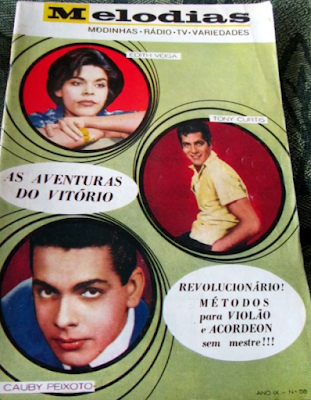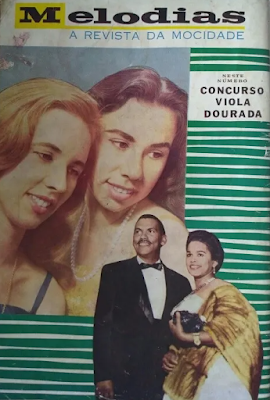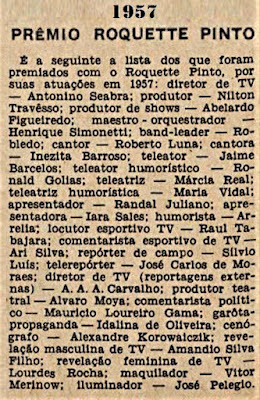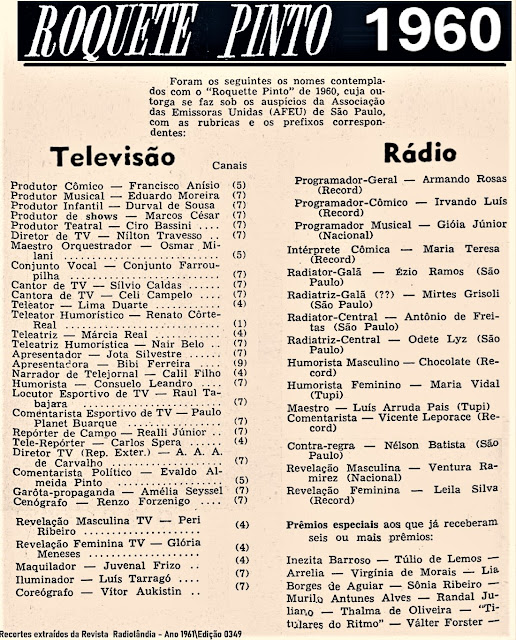Brazilian show business 50s, 60s & 70s
Show business in Brazil in the 50s, 60s and 70s which includes TV, radio, records and magazines.
Wednesday, 7 January 2026
MELODIAS 1961 & 1962
Wednesday, 21 May 2025
Thaís Matarazzo eulogy by Gui Castro e Neves on 12 January 2023
THAIS MATARAZZO (1982-2023) foi a mais prolífera pesquisadora memorialista que tivemos. Desconheço outro que tenha produzido – e vivido – tanto em tão curto tempo de vida. A quantidade de encontros, eventos, entrevistas, programas, textos e livros que realizou, jamais serão precisamente contabilizados, assim como a imensa significância deste prodígio precoce para um “país sem memória”. E detalhe: Independente.
Apesar da nossa diferença de idade de apenas 11 dias (Geminianos), quando ela entrou na minha vida eu era já seu fã, leitor, seguidor. Na época, ela se desfazia do seu gigantesco acervo, o qual distribuiu por doação entre diversas instituições. Seus discos 78 rpm, por exemplo, tiveram que ser divididos entre duas entidades, vide que uma delas não possuía condições de abrigar a coleção completa. Foi assim que por duas ocasiões, Thais veio de São Paulo – de ônibus – trazendo uma caixa enorme em tamanho e peso com material da sua coleção de presente para mim! Da primeira vez eu mal podia acreditar, tomei um susto.
Foi ela quem me publicou pela primeira vez em livro, quatro ao todo. Foi ela quem me alertou sobre pessoas que provaram que ela estava certa. Foi ela quem garantiu que muitos projetos fossem concretizados para muita gente. Foi ela quem resgatou as Irmãs Meireles para os dois lados do Atlântico e até esteve com Cecília & Aurora Miranda! Abordou personagens e acontecimentos nunca antes revisitados em publicações.
Adorava o Rio de Janeiro, que tantas vezes homenageou, e estivemos juntos em diversas das suas inúmeras vindas à cidade, muitas delas com a sua mãe, sempre delicada e gentil. Algumas das mais memoráveis, foram quando a levei para conhecer a estátua de Clarice Lispector no Leme e quando conseguimos autorização para visitar as ruínas do Dancing Avenida (1944-69). E das nossas tantas fotos, escolhi esta por ser da única vez que nos encontramos na sua terra, na sua São Paulo, junto do espetacular Carlus Maximus, meu pesquisador brasileiro favorito e um duo perfeito com Thais.
É tudo muito triste e injusto, porém Thais Matarazzo viveu mais e maior do que muita gente com o triplo dos seus recursos e o dobro da sua idade. Serei sempre muito agradecido a ela, que de fato fez diferença na minha vida, na minha história. E concluo com uma quadra portuguesa que ela adorava – e adaptou – do António Aleixo (1899-1949), a qual apresentou para mim sabendo que eu a tomaria de modo pessoal:
“Quem canta por conta própria quer,
Com muita razão
Antes ser pardal da rua
Do que rouxinol na procissão.”
Monday, 24 February 2025
Sunday avo at DoCarmo's, on rua Oscar Freire,1º. Fevereiro 2009
Sim, hoje, 1º. Fevereiro de 2009, aconteceu mais um sarau com a já famosa Turma do Páteo, e dessa vez a Turma deixou a Zona Leste de lado para se embrenhar pela Zona Oeste, mais precisamente rua Oscar Freire, no salão-de-festas do prédio onde reside Maria DoCarmo, amiga dileta da bióloga Neuza, frequentadora assídua do Páteo do Collegio.
Estava marcado para começar às 13:00 horas. Eu cheguei meia-hora mais cêdo, e lá já estavam Milton Baumgarten & Clau, que já tinham virtualmente armado o sistema de som num palco improvisado, mais Thaís Matarazzo, afixando fotos de Carmen Miranda às portas de vidro do salão, pois afinal, em 9 dias celebrariámos o Centenário do nascimento da Pequena Notável.
No salão, mesinhas plásticas brancas, com toalhas brancas, rodeadas por 4 cadeiras brancas, tendo em cada qual um vasinho com uma rosa vermelha, dando a impressão de um pequeno restaurante ou um night-club improvisado. Já havia várias pessoas, e mais iam chegando.
Eu, Gabriel Gonzaga e os cantores, Vander, cantor e tocador de timba, nos sentamos numa mesinho perto da passagem para os banheiros e fomos revisando, rapidamente, as marchinhas que que tínhamos ensaiado no domingo anterior no Parque da Água Branca. A acústica do longo salão não era das piores, embora só depois percebemos que, com a amplificação elétrica do som, havia uma reverberação não muito agradável, que poderia confundir os músicos e cantores.
De-repente, Neuza Guerreiro tomou o microfone e conclamou os presentes a saírem de seus lugares e irem até o fundo, onde a comida já estava pronta a ser devorada. Aconselhou a Turma do Páteo a fazer o mesmo, no que ninguém discordou. Para vegetariano a coisa estava brava, então eu fiquei só na sobre-mesa, como não gosto de comer antes de cantar tudo saiu à contento.
Aos poucos fomos nos acomodando por detrás dos microfones e do teclado, que tinha sido montado estratégiamente do lado direito de quem olha a platéia. O principal problema dos violonistas é sempre onde colocar as partituras, letras e cifras, o que foi prontamente solucionado solucionado por uma inteligente sugestão da Thaís, para que arrastássemos uma mesinha logo em frente dos 2 violeiros (eu e Gabriel). Eureka! Tudo ficou perfeito.
Eu já tinha separado as folhas de papel-sulfite com as marchinhas que seriam tocadas pelo Gabriel e por mim. Gabriel iniciaria o Sarau com 'Lig lig lé' (1937). Milton, o mestre-de-cerimônias conversou um pouco com a platéia, dizendo algo que só eu escutava, mas como ainda estava entretido com a organização dos papéia, não entendi direito, mas acho que ele deu uma idéia do tema Carnavalesco do sarau. Gabriel começou gentilmente a tocar a 'marcha do chinês que só come uma vez por mês, e de-repente, num segundo, o salão inteiro estava cantando junto. Eu fiquei surpreso com a rapidez com que se deu a ignição quase total.
Quando Gabriel emendou com 'Mamãe eu quero', de Jararaca, coincidentemente de 1937, também; as pessoas começaram a dançar e a fazer o famoso 'trenzinho', que geralmente se fazem em salões de bailes carnavalescos dos anos 60s.
O fato de 'Lig lig lé' ter atraído quase toda a platéia, foi, a princípio, não entendido por mim, mas Lela (Denise Duran) me alertou em um telefonema, que 'Lig lig lé' é o tema-de-abertura da novela das 7 da TV Globo, intitulada 'Negócio da China'. Agora está explicado porque a platéia toda cantou uma marchinha de 1937, como se fosse um hit do momento, o que na verdade, não deixa de ser.
Todos ainda cantavam a marchinha do Jararaca, quando Gabriel lascou 'Chiquita Bacana'...lá da Martinica (1949), e logo em seguida, 'Periquitinho Verde' (1938) grande sucesso de Dyrcinha Baptista, de 1938.
Apesar de eu estar olhando a platéia apenas de soslaio, pois não queria misturar meus acordes, acho que as pessoas estavam enlouquecidas; todas cantando no ultimo volume de seus pulmões. Pelo menos essa foi minha impressão que eu tinha alí do meu 'curralzinho'. Na verdade eu estava achando tudo muito engraçado e quase tive um acesso de riso enquanto tocava e cantava...não sei explicar, talvez por puro contentamento.
Eu sentia que estávamos uma verdadeira máquina de sucessos carnavalescos, capitaneados por Gabriel ao violão, eu, no segundo violão; Vander Loureiro na timba, Cristina Costa ao pandeiro e as vozes de Mara, Thaís, Sirlei, Milton e Nenê. Gabriel, então, detonou 'Aurora' (1941), que todos responderam com ô ô ô ô, Aurora!... e logo em seguida, a mais famosa marcha carnavalesca de todos os tempos: 'A Jardineira' (1939).
Mal estávamos no meio de uma canção, já estávamos pensando na próxima, que no caso era 'Cidade Maravilhosa', hino de louvor ao nosso querido Rio de Janeiro, lançado por Aurora Miranda em 1935; e para não deixar cair a petéca, 'Vai com jeito' (1957), a marchinha mais explícita sobre a questão de escolher um lugar para a prática do (famoso) sexo. A escolha, no caso, é do freguês: tomar banho em Paquetá; pic-nic na Barra da Tijuca (quando ainda dava para se fazer isso) ou um 'programa' no Joá, visto por todos como um 'programa do chuá'. Como se vê, o negócio é, na verdade, o 'programa' em sim e não o local, que acaba sendo irrelevante. Essa talvez seja a música mais explícita sexualmente da história da nossa MPB.
A essa altura eu já nem sei mais a sequência das marchas; 'Saca-rolha' (1954), que é sempre sucesso garantido; o samba carnavalesco 'Lata d'água na cabeça' (1951), de melodia muito bonita; 'Uma andorinha não faz verão' (1934), de Lamartine Babo, seguramente o maior compositor de marchas da nossa história; 'Yes, nós temos banana' (1938), que saiu um pouco desmingüelada'; 'Marchinha do grande galo' (1935), outro sucesso incontestável em qualquer salão. Quem não se identifica com o infeliz galo que teve sua companheira morta...e o vizinho que passa pela mesma experiência galinácea e ainda se regojiza do acontecimento? Seria isso um descarado incentivo ao assassinato de cônjuges?
'Linda morena' (1933) era a marcha favorita do Lalá; 'Pierrot apaixonado' (1936), que levou um grande chute da Colombina. que era declaradamente alcoólatra, foi tomar vermouth com amendoim; 'Allah-lá-ô' (1941) que todos cantam com gusto, sempre me faz lembrar que se Obama Bin Laden soubesse disso, não iria gostar de ver aquele bando de foliões tomando Seu Santo Nome em vão e, na certa, jogaria um bomba no meio do salão.
A essa altura o pessoal que dançava começou a se cansar, pois não houve intermezzo, e os músicos começaram a 'embolar o meio de campo'. 'Aurora' foi cantada novamente, pois eu já não sabia o que tinha ou não tinha sido cantado. Houve então uma pausa que refresca, embora não houvesse Coca-Cola no recinto. Nessa 'embolada', acabamos não cantando 'Grau 10' (1935), 'Ride palhaço' (1934), 'Maria Escandalosa' (1955) e 'A casta Susana' (1938).
Milton retomou suas atividades de animador de auditória, e Vander cantou 'Morena boca de ouro' e 'Feitiço da Vila'. A primeira, eu sempre toco bem, mas hoje saiu 'arrastada', e Vander teve que pegar sua timba para consertar o ritmo. Eu não sei como eu me deixei levar em ritmo arrastado, já que sou do tipo que toca mais rápido que o usual.
Nenê, apelido do Senhor Alberto contou suas piadas ao microfone, que dessa vez foram três. Contou uma inédia, para mim, que é a do homem que tinha apelido de 'Barbudo', resolveu raspá-la, para desencanto próprio. Ele, para surpreender a esposa, chega em casa e é confundido com o amante dela, que lhe diz desapercebidamente: 'Cuidado, que está na hora do 'Barbudo' chegar'. Contou a outra do veneno, a da bolinha-de-gude. Todos riram muito.
Houve alguém na platéia que pediu uma 'canja' e foi atendida pelo Milton. Ela cantou o samba 'Lata d'água', mas acabou não dando conta do recado e parou pela metade mesmo. A platéia comecou a 'tomar conta' do show e a pedir músicas.
Mara cantou 'Cafezal em flor', de Luiz Carlos Paraná, sucesso de Cascatinha & Inhana, mas a acústica do local, mais o fato de eu ter ficado sem a letra para o contra-canto, fez com que a performance não fosse das melhores. É uma pena, pois no ensaio tinha ficado ótima. Mara também cantou uma marcha-rancho acompanhada apenas por Gabriel, que não consigo me lembrar. Teria sido 'Estrêla do mar' (Um pequenino grão de areia)? Mais um caso de incompatibilidade sexual: imagine um grão de areia transando com uma estrêla! E ainda tem um rebento dessa união: a estrêla do mar. Pode?
Nisso, lá se foram 'Mal me quer' e 'Estão voltando as flôres', que ficaram para as calendas, ou seja, não foram executadas pois a bagunça estava começando a tomar conta do local. Ah, o Vander Loureiro voltou para cantar 'Florisbela' (1939), gravação do Caboclinho querido.
Houve um hiato então, quando Neuza Guerreiro fez um monólogo ao microfone sobre nomes de ruas de São Paulo, já que Neuza é uma especialista em trivia sobre a Paulicéia. Nisso, Denise Duran, mais conhecida como Lela entre nós, que havia sido chamada para continuar do show, disse que existe uma Avenida Dolores Duran na Zona Leste de São Paulo, além de um Colégio Estadual Dolores Duran. Alguém da platéia queria saber detalhes sobre um programa especial sobre Dolores Duran exibido pela TV Globo algum tempo atrás, e Denise, prontamente o atendeu.
Denise cantou 'A banca do distinto' (não fala com pobre, não dá mão a preto, não carrega embrulho...) de Billy Blanco e foi competentemente acompanhada por Gabriel Gonzaga. Foi muito aplaudida e bisou com 'Pela rua'. Imploraram para que Denise cantasse 'A noite do meu bem' (1959), o grande sucesso de sua falecida irmã, Dolores Duran. Cristina Costa se prontificou a acompanhá-la em seu teclado, ao qual ele deu som de orgão. A performance foi amplamente pelos presentes. Um orgão bem tocado sempre toca os corações românticos... o Nenê que o diga; ele confessou-me que ficou maravilhado pelo som.
A essa altura eu não consigo me lembrar da cronologia exata dos fatos, pois estão embaralhados na minha memória. Cristina Costa cantou duas composições suas: a do burrinho e uma outra que não cheguei a ouvir direito, pois estava no banheiro tentando me lembrar da melodia de 'Se as rosas falassem', de Cartola, que alguém tinha pedido ao Vander para cantar. Não consegui lembrar da melodia, e Vander acabou sendo acompanhado pela Cristina.
Mara cantou 'O que vier eu traço', gravação da Ademilde Fonseca... eu só me lembro disso pois eu acompanhei a Mara. Sirlei queria que cantássemos 'Bandeira branca' (1970), o último grande sucesso carnavalesco. Logo em seguida emendamos com 'Máscara negra' de Zé Ketti (1967), o penúltimo grande sucesso carnavalesco.
Eu pensei que o show estive terminado, mas, qual o que! Resolveram que a 'turma da casa', a DoCarmo e suas amigas, iriam apresentar uma paródia de 'O xóte das meninas' (Ela só quer, só pensa em namorar...) do Luiz Gonzaga, e assim o fizeram.
Thaís Matarazzo & Milton Baumgarten apresentaram o quadro do português Manuel e sua Maria, que sempre é bem engraçado, não importando o público. Aliás, Milton estava o próprio 'portuga', incorporando o Manuel de maneira 'mediúnica'. Até seu andar fica diferente, sem contar o vasto bigode.
Eu já tinha guardado minha viola no fundo do baú quando disseram que ainda iríamos cantar mais marchinhas. Ai, Jesus, tive que tirar o violão do saco novamente. Cantamos 'Tahí' (1930), para homenagear a homenageada, que aliás, ninguém lembrou de lembrar durante o desenrolar do espetáculo. E a derradeira marchinha foi 'O balancê', de João de Barro, gravação de Carmen Miranda.
E olha que nem homenageamos a Zazá, amiga da Lela (Denise Duran), mas só p'ra chatear, todos nós cantamos 'Cadê Zazá?' (1948) a capella, só para render uma singela homenagem a tão querida pessoa.
Gente, se eu esqueci algo relevante, me perdoem, mas minha cabeça já está dando 'tilt'. Me escrevam lembrando algum ato falho e eu retificarei.
Luiz Amorim, 1º. Fevereiro 2009.
Monday, 27 May 2024
Roquette 1957 - 1958 - 1960 - 1962 - 1963 - 1964 - 1965

.jpg)
.jpg)








.PNG)




.PNG)
.PNG)























.jpg)
%20(1).jpg)
.jpg)
.jpg)




.PNG)
.PNG)
.PNG)
.PNG)
.jpg)
.jpg)














